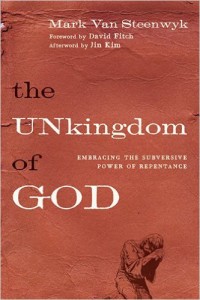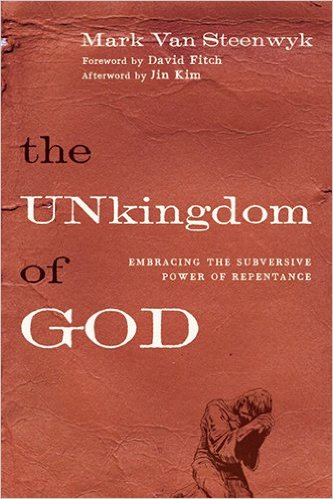“I By My Works Will Show You My Faith” (James 2:18)
In the branch of Christianity labeled “The Emerging Church” or “Progressive Christianity,” there is an increasing emphasis in acting out one’s faith. We’re resurrecting one of the central characteristics of the early church. Those early followers of “The Way” understood that they were to live out their faith in a loving, gracious and forgiving God by being Christ like. All too soon the emphasis in the Church changed from “How do you live?” to “What do you believe?” Councils hammered out what true Christians were to believe, while inquisitions encouraged the faithful to believe the correct teachings of the church. This emphasis has occupied the Church for a majority of its history. Now however, as the old Bob Dylan songs suggests, “The times they are a changin’.”
 This changing perspective is clearly demonstrated in two books that I had the opportunity to read this summer. The first book is, Abandon: Laying Aside Your Plan for God’s Purpose, Tim Timberlake, Destiny Image Publishers, Shippensburg, PA, 2015.
This changing perspective is clearly demonstrated in two books that I had the opportunity to read this summer. The first book is, Abandon: Laying Aside Your Plan for God’s Purpose, Tim Timberlake, Destiny Image Publishers, Shippensburg, PA, 2015.
Timberlake lays out the foundation early in his book that Christianity isn’t a religion, but rather it is a lifestyle. At the core of that lifestyle, is abandonment. That by itself it isn’t too earthshattering. Most would agree that we should abandon our sinful practices and habits (though there is considerable disagreement over what is sinful and what is not). Timberlake takes the idea of abandonment further so that it includes letting go of our desires and perhaps even our visions. All is to be abandoned for the sake of obeying God and God alone.
I certainly appreciate the vigorous discipleship that Timberlake espouses. There are too few among the two billion Christians in the world who have actually accepted Jesus’ invitation to deny themselves, take up their crosses and to follow Jesus. Timberlake’s call, I think, is similar to that of Dietrich Bonhoeffer in his classic work, The Cost of Discipleship, though it doesn’t have the theological depth nor the emphasis on grace. This is where I think Timberlake stumbles.
There is a fine line between a life lived in grace and a life of works. I think Timberlake crosses that line. He extols his readers not to let anything get in the way of their obedience to God. This takes a lot of hard work—work that may take our eyes off God’s love and grace and focus on our own efforts. I see this clearly illustrated in Timberlake’s statement, “Believe what God told you to do and success will follow.” But, God may not call us to success. God may call us only to obedience. When we blame perceived failures on our lack of faith, we begin a journey down a road that leads us far from the gospel of Jesus Christ. Striving for holiness and perfection we tend to forget that this side of heaven we will never be more than a sinner/saint.
The book is worth the read. It calls us, who identify ourselves as disciples of Jesus Christ, to a more intentional, deeper commitment to following Jesus. But there is a word of caution. While reading, don’t lose sight of our total dependence on God’s love and grace.
The second book that I read was entitled, The Unkingdom of God: Embracing the Subversive Power of Repentance, Mark Van Steenwyke, IVP Books, Downers Grove, 2013. This is a powerful, thought provoking book.
Several Biblical scholars (Marcus Borg, John Dominic Crossan, etc.) stress that the kingdom Jesus proclaimed was the antithesis of the Roman Empire. The Roman Empire was based on domination, control and peace through war. Jesus’ kingdom was centered on God’s grace, love, and peace through forgiveness. Van Steenwyke’s premise is that the Christian Church and individual Christians have opted for the kingdom of Rome rather than the kingdom (unkingdom) of God.
Historically it is easy to see his point. The Holy Roman Empire was anything but gracious, loving and forgiving. For centuries clergy dominated the laity and administrated churches like their own empires. The colonization of Africa and Asia, in part through the work of missionaries, extended the domination of European nations and the Church. Van Steenwyke writes that Christians continue to live lives of domination, though not as openly as in previous centuries.
Van Steenwyke envisions an unkingdom–a life based love, forgiveness and grace—the teachings of Jesus. This unkingdom begins by recognizing how we seek lordship over our peers and domination over others. This is an evolving process. We start down the road of confession and as we travel we recognize other areas where domination is the way of our lives. Confession and forgiveness, though, open doors for community, unity, love and grace.
I enjoyed the book. I found it enlightening and challenging. I’m not ready to live in the unkingdom as fully as Van Steenwyke, but he certainly presents an example to follow. If you want to be challenged in your life of faith and made a little uncomfortable, this is the book for you.
Disclosure of Material Connection: I received these books free from the author/or publisher through the Speakeasy blogging book review network. I was not required to write a positive review. The opinions I have expressed are my own. I am disclosing this in accordance with the Federal Trade Commission’s 16 CFR, Part 255.

